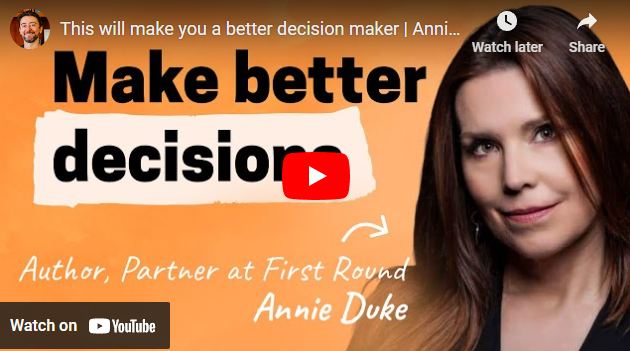This will make you a better decision maker
Annie Duke (author of “Thinking in Bets” and “Quit”, former pro poker player)
5/10/20243 min read


Yesterday I listened This will make you a better decision maker | Annie Duke (author of “Thinking in Bets” and “Quit”, former pro poker player) in Lenny's podcast. Here is the link if you'd like to listen.
The books I just ordered right after this podcast I listed below with the best links possible :)
Thinking In Bets by Annie Duke - Amazon Link
Quit : The Power of Knowing When to Walk Away by Annie Duke - Idefix Link
Hızlı ve Yavaş Düşünme by Daniel Kahneman - Kitapyurdu Link
My takeaways:
80 percent of the meetings are double clicking. Oh, I agree.
If we can focus the discussion on places that people disagree, we're much better off.
A meeting: Discover, discuss, decide.
DISCUSS only supposed to be happening in the meeting. So what about, discover and decide?
DISCOVER what people think before you get in a room independently of each other.
How would you that ?
Well, lets imagine that you're going to have a meeting about the product roadmap. So you would say to yourself in this meeting, what are the opinions that I need to get from the people in the room? It could be a brainstorm. What are all the different features that we could develop? So it could be a brainstorm. Fine. Write to them INDEPENDENTLY and say, '' hey, free for off. Just come up with all the different features that you think would be reasonable for us to consider developing and then give me forced rank from best to worst of your own ideas with some three to five sentence rationale as to why you have these things in order.'' And so I could do that, maybe we already have a list. I can send that out for a forced rank to everybody. Okay, so here's the final list of things we're really considering. Prioritize those for me, just force rank them. And then again, give me a rationale. etc.
You can use google forms ( then transfer to google sheets) to collect everybody's opinions so they do not see each other's decision ( dont sent them like 'reply all')
So the attendees can come to the meeting room and discuss accordingly. That's a NOMINAL group! It's a group that at that moment is working independently and asynchronously of each other.
(In a meeting not everybody feels equally heard. But when you work as a nominal group... also since one won't hear some other's opinion first, then he is not going to conform his opinions to hers. )
and then you do the same thing for deciding. The decision should not be made in a room, it's made either.
You can have a vote forum where people go vote in private about the way they're leaning.
The word 'alignment' is stupid, and it shouldn't be used. Because it doesn't exist. You have 10 people in a room, they are really different people with different opinions, and they're never going to come out of the room agreeing with each other. And it's really bad if the expectation is that they're supposed to.
Plus, if the goal is alignment, if the goal is agreement, then the meeting becomes coercive and you never want that.
The power of the word for leadership: 'NEVERTHELESS'
In child punishment ( I hear you nevertheless you are grounded for two weeks) or In leadership. ( I've heard both of you and I know that this isn't going Annie's way. Nevertheless, trying to think what all of our goals are, this is what the decision is going to be and it's totally fine that you ended up not agreeing with each other because it's reality.)
That allows me to do is get a better sense of what the space of decision is.
I liked this sentence: 'What are the things that are correlated with the outcome that I eventually desire?'
pre-mortems are great only if you attach a pre-commitment with it. Pre-mortems are especially important since they give the sign about the kill criterias. Use the pre-mortem to set up kill criteria. When to pivot or stop because once we actually launch something, we're very, very slow to decide to quit.
Create structure around those signals that you've spotted and commit to actions that you're going to take if you see those signals. (That's the best use of a pre-mortem)
And as smart as Stewart Butterfield is, he couldn't see Slack until he quit Glitch. And that is a true cost that he would've born of continuing with Glitch.
(Glitch is a massive multiplayer online world-building cooperative game, they had 6 million dollars in the bank, 5000 have diehard users, but the customer acquisition even though a paid marketing campaign was really problematic, so he shut it down after 6 months of marketing. Two days later, he has got this communication tool that his team is using in order to develop this product that everybody loves. Actually they really like that. And now that's SLACK! )
Is this worthwhile or not? Would I start this today?
Make it explicit what is implicit.
